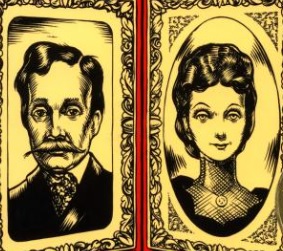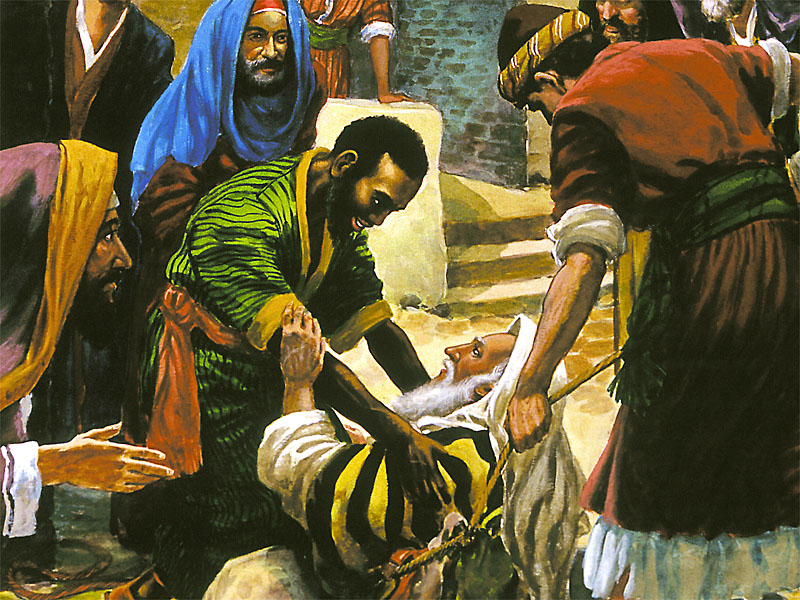My emancipation from television… It might seem a strong phrase, since the word emancipation is usually connected with Abraham Lincoln’s Emancipation Proclamation. In comparison, yes, the phrase is strong. The plight of the slaves should not be minimized, and the intent of my phrasing is not to diminish the slaves but to emphasize the bondage that is possible to the television.
I grew up with television. On Saturday mornings, I was the first person awake in the house and would be in the living room shortly before 5:30 a.m., watching the test pattern and waiting for the Woody Woodpecker cartoon to begin. I would be sitting there continuously until about noon when the various cartoons ended. Weekdays after school, I would arrive home and turn on the television for old comedy movies or for re-runs of old half-hour sitcoms. I would watch the news with my parents starting at 6:00, and then at 7:00 would be game shows like Wheel of Fortune and Jeopardy. After that, we usually watched sports. When I went to college, I would go to sleep with the television on ESPN and would wake up in the morning with it still on. I remember back in the mid-1980’s that a visiting minister spoke at church and challenged the people to give up television for a week. It was a completely foreign notion for me. We didn’t take the challenge, but I still remember it because it seemed so strange.
So given that history, how did we become a family without television? My wife had a lot to do with it. When our oldest daughter was a toddler, I was still spending Sunday afternoons watching the New England Patriots’ football games. We decided that wasn’t an honorable way to spend the Lord’s Day, so we tried going television-free on Sundays, unless we were watching a recorded sermon or Gaither Homecoming concert. It was hard. I was so used to having the television on, and so used to my nearly twenty years of Sunday afternoon football, that I really had difficulty giving it up. But I knew it was the right thing to do, so we stuck it out and it eventually became easier. From there my wife and I began to question other television fare that we had previously considered harmless and concluded that it really wasn’t worth watching. We thought it was mindless entertainment – simply a chance to relax and unwind – but, in fact, it was filled with subtle messages that were intended to reshape viewers’ convictions and weaken any sense of a Christian’s life, beliefs, and service. It also was taking up valuable time that should have been spent more profitably. And so, we unhooked the antenna and moved the television out of the living room. We still have it available to watch messages or pre-screened educational programs, but we haven’t had access to regular programming for close to a decade.
The freedom that comes from not being glued to the television and from not being dependent on it for filling time or for finding entertainment is substantial. When our children are grown and raising families of their own, I hope they will continue to live TV-free and to redeem the time God gives them each day. Anything less is a step backward and will leave them (and their descendents) needing to someday re-win a battle that has already been won, all while accumulating mental and spiritual scars.
There are Christian leaders who say you must embrace the culture – whether that is expressed in video, in sports, in music, in art, in books or magazines, in style of dress, or in any other expression of thought or belief – in order to win to Christ those who are in the culture. I have difficulty finding support for that in Scripture. In his second letter to believers in Corinth – a city full of pagans – Paul advised them to seek holiness and to avoid compromise with the wicked culture around them. The first of these verses is used in modern churches to note that believers should not marry unbelievers (which is undoubtedly true), but its original intent applies in a much wider context:
Be ye not unequally yoked together with unbelievers: for what fellowship hath righteousness with unrighteousness? and what communion hath light with darkness? And what concord hath Christ with Belial? or what part hath he that believeth with an infidel? And what agreement hath the temple of God with idols? for ye are the temple of the living God; as God hath said, I will dwell in them, and walk in them; and I will be their God, and they shall be my people. Wherefore come out from among them, and be ye separate, saith the Lord, and touch not the unclean thing; and I will receive you, And will be a Father unto you, and ye shall be my sons and daughters, saith the Lord Almighty. ~ II Corinthians 6:14-18
In Jesus’ prayer before His betrayal by Judas, He noted the distinction between the world and those who make up His bride:
I have given them thy word; and the world hath hated them, because they are not of the world, even as I am not of the world. I pray not that thou shouldest take them out of the world, but that thou shouldest keep them from the evil. They are not of the world, even as I am not of the world. Sanctify them through thy truth: thy word is truth. As thou hast sent me into the world, even so have I also sent them into the world. ~ John 17:14-18
Notably, He did not ask the Father to remove them from the world, but that they might be kept pure from its evils. And, He pointed out that He sends His children out into the world for the same purpose that He was sent into the world – to be a shining light for God. In His sermon on the mount, Jesus instructed His followers to “Let your light so shine before men, that they may see your good works, and glorify your Father which is in heaven.” (Matthew 5:16)
In his first epistle, Peter noted the distinctiveness of God’s people. To be distinct – to be recognized as being peculiar – one must be different. Otherwise, there is no peculiarity, and with no peculiarity, there is no sanctification, as sanctification literally means “to be set apart for a sacred purpose”.
But ye are a chosen generation, a royal priesthood, an holy nation, a peculiar people; that ye should shew forth the praises of him who hath called you out of darkness into his marvellous light: Which in time past were not a people, but are now the people of God: which had not obtained mercy, but now have obtained mercy. Dearly beloved, I beseech you as strangers and pilgrims, abstain from fleshly lusts, which war against the soul; Having your conversation honest among the Gentiles: that, whereas they speak against you as evildoers, they may by your good works, which they shall behold, glorify God in the day of visitation. ~ I Peter 2:9-12
Finally, in John’s first epistle, he very aptly describes the enticements of the world. In consideration of modern media, one cannot come up with a more appropriate description:
Love not the world, neither the things that are in the world. If any man love the world, the love of the Father is not in him. For all that is in the world, the lust of the flesh, and the lust of the eyes, and the pride of life, is not of the Father, but is of the world. And the world passeth away, and the lust thereof: but he that doeth the will of God abideth for ever. ~ I John 2:15-17
And so, if Scripture confirms repeatedly that God’s people are to be set apart in thought and in action, that must be our standard – not modern preachers who water down the gospel to try to get more bodies in the pews, more sales of their books, and more accolades from the rich and famous. Leave the television behind, take up your cross and follow Christ.

Copyright © 2013












